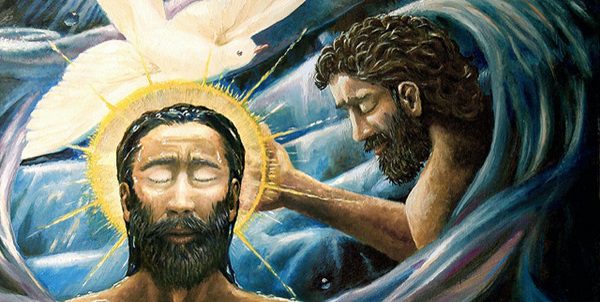This Sunday, Christians will celebrate Jesus’ baptism.
There are a lot of questions surrounding his baptism. For example, what’s up with Jesus and John?
In Matthew’s Gospel, John says to Jesus just before the baptism, “I need to be baptized by you, and do you come to me?” John recognizes that Jesus is more powerful, so Jesus should baptize him. But, Jesus insists that John baptize him, “for it is proper for us in this way to fulfill all righteousness.”
How did Jesus’ baptism “fulfill all righteousness”? The text is enigmatic, but we will find answers if we look at Jesus’ ministry as a whole.
Tempted at Baptism
After Jesus’ baptism, the Spirit led him into the desert to be tempted. The devil tempted him with power and prestige. We usually think that Jesus was first tempted in the desert. But Jesus was tempted before the desert. He was tempted at his baptism.
John was humble when he asked Jesus to baptize him. But it was a humility that sought to elevate Jesus to a position of power over John. He told people, “I baptize you with water; but one who is more powerful than I is coming … His winnowing fork is in his hand, to clear the threshing floor and to gather the wheat into his granary; but the chaff he will burn with unquenchable fire.”
Ouch.
There are many interpretations of John’s statement. But if he thought Jesus’ “power” was associated with violence, he was sorely mistaken. Jesus resisted that kind of power and rivalry throughout his life. Jesus came to serve, not to be elevated above anyone.
True Righteousness and Inter-Dividuality
For Jesus, righteousness isn’t about power over and against another. Righteousness isn’t about a rivalry of defeating our opponents. Rather, righteousness is about love and service. If righteousness holds any kind of power at all, it’s a power that is with others, not against them.
Jesus’ baptism fulfilled “all righteousness” because it showed that the Son of God knew he was dependent upon others. He needed John. Not even the Son of God could live independently from his fellow human beings. He, like all of us, was inter-dependent.
The anthropologist René Girard claims that we are not individuals. We are actually inter-dividuals. Openly acknowledging our inter-dividuality, or our inter-dependence, allows us to avoid rivalry and live in the spirit of love.
At his baptism, Jesus modeled what this open acknowledgment of inter-dividuality looks like. And in doing so, he fulfilled all righteousness.
Image: Flickr, Waiting on the Word, Baptism of Christ 10. Creative Commons License, some changes made.
Stay in the loop! Like Teaching Nonviolent Atonement on Facebook!












